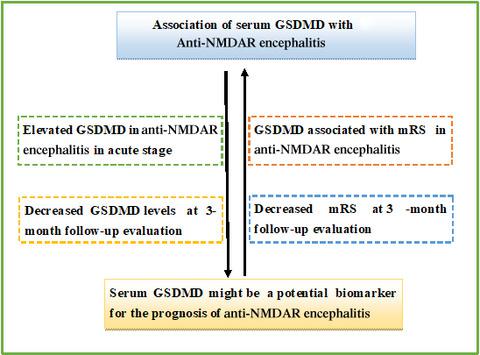当前位置:
X-MOL 学术
›
J. Neurochem.
›
论文详情
Our official English website, www.x-mol.net, welcomes your
feedback! (Note: you will need to create a separate account there.)
Association of serum Gasdermin D with anti-N-methyl-D-aspartate receptor encephalitis
Journal of Neurochemistry ( IF 4.2 ) Pub Date : 2021-08-21 , DOI: 10.1111/jnc.15497 Xiaoyu Ma 1 , Chen Chen 1 , Yaxin Lu 2 , Ling Fang 3 , Baohua Cao 4 , Xueqiang Hu 1 , Wei Qiu 1 , Yaqing Shu 1
Journal of Neurochemistry ( IF 4.2 ) Pub Date : 2021-08-21 , DOI: 10.1111/jnc.15497 Xiaoyu Ma 1 , Chen Chen 1 , Yaxin Lu 2 , Ling Fang 3 , Baohua Cao 4 , Xueqiang Hu 1 , Wei Qiu 1 , Yaqing Shu 1
Affiliation

|
Anti-N-methyl-D-aspartate receptor (NMDAR) encephalitis is an autoimmune disease of the central nervous system. Gasdermin D (GSDMD) is associated with autoimmune disorders and neuroinflammatory disorders, but its role in anti-NMDAR encephalitis is unclear. In this study, we measured serum levels of GSDMD in 42 patients with anti-NMDAR encephalitis and 25 healthy controls. Of the 42 patients, 17 had follow-up evaluation of GSDMD levels and modified Rankin scale (mRS) scores at 3 months. Association of GSDMD with anti-NMDAR encephalitis and its clinical parameters were evaluated. Serum GSDMD levels were significantly higher in patients with anti-NMDAR encephalitis than in healthy controls (p = 0.002, padjusted = 0.009), especially in males (p = 0.001, padjusted = 0.022). This was also evident in patients with severe impairment (mRS >3 vs mRS ≤3; p < 0.001). Serum GSDMD was associated with mRS before and after adjustment for age and gender (r = 0.440 and 0.430, p = 0.004 and 0.006, respectively) as well as serum CH50 (r = −0.419 and −0.426, p = 0.011 and 0.012, respectively). Furthermore, 3-month follow-up evaluation revealed that after treatment, anti-NMDAR encephalitis patients had significantly decreased serum GSDMD levels (p = 0.007) and significantly decreased mRS scores (p = 0.002) compared with before treatment. Furthermore, the changes in mRS scores were negatively associated with changes in GSDMD levels, although the associations were not significant (r = −0.222, p = 0.393). Our findings show that serum GSDMD levels are elevated in anti-NMDAR encephalitis and are associated with disease prognosis.
中文翻译:

血清 Gasdermin D 与抗 N-甲基-D-天冬氨酸受体脑炎的关系
抗 N-甲基-D-天冬氨酸受体 (NMDAR) 脑炎是一种中枢神经系统自身免疫性疾病。Gasdermin D (GSDMD) 与自身免疫性疾病和神经炎症性疾病有关,但其在抗 NMDAR 脑炎中的作用尚不清楚。在这项研究中,我们测量了 42 名抗 NMDAR 脑炎患者和 25 名健康对照者的血清 GSDMD 水平。在 42 名患者中,17 名在 3 个月时对 GSDMD 水平和改良 Rankin 量表 (mRS) 评分进行了随访评估。评估了 GSDMD 与抗 NMDAR 脑炎的相关性及其临床参数。抗 NMDAR 脑炎患者的血清 GSDMD 水平显着高于健康对照组(p = 0.002,调整后的p = 0.009),尤其是男性(p = 0.001,调整后的p = 0.022)。这在严重受损的患者中也很明显(mRS >3 vs mRS ≤3;p < 0.001)。在调整年龄和性别(分别为r = 0.440 和 0.430,p = 0.004 和 0.006)以及血清 CH50(分别为r = -0.419 和 -0.426,p = 0.011 和 0.012 )之前和之后,血清 GSDMD 与 mRS 相关)。此外,3个月的随访评估显示,抗NMDAR脑炎患者治疗后血清GSDMD水平显着降低(p = 0.007),mRS评分显着降低(p = 0.002) 与治疗前相比。此外,mRS 评分的变化与 GSDMD 水平的变化呈负相关,尽管这种关联并不显着(r = -0.222,p = 0.393)。我们的研究结果表明,血清 GSDMD 水平在抗 NMDAR 脑炎中升高,并且与疾病预后相关。
更新日期:2021-08-21
中文翻译:

血清 Gasdermin D 与抗 N-甲基-D-天冬氨酸受体脑炎的关系
抗 N-甲基-D-天冬氨酸受体 (NMDAR) 脑炎是一种中枢神经系统自身免疫性疾病。Gasdermin D (GSDMD) 与自身免疫性疾病和神经炎症性疾病有关,但其在抗 NMDAR 脑炎中的作用尚不清楚。在这项研究中,我们测量了 42 名抗 NMDAR 脑炎患者和 25 名健康对照者的血清 GSDMD 水平。在 42 名患者中,17 名在 3 个月时对 GSDMD 水平和改良 Rankin 量表 (mRS) 评分进行了随访评估。评估了 GSDMD 与抗 NMDAR 脑炎的相关性及其临床参数。抗 NMDAR 脑炎患者的血清 GSDMD 水平显着高于健康对照组(p = 0.002,调整后的p = 0.009),尤其是男性(p = 0.001,调整后的p = 0.022)。这在严重受损的患者中也很明显(mRS >3 vs mRS ≤3;p < 0.001)。在调整年龄和性别(分别为r = 0.440 和 0.430,p = 0.004 和 0.006)以及血清 CH50(分别为r = -0.419 和 -0.426,p = 0.011 和 0.012 )之前和之后,血清 GSDMD 与 mRS 相关)。此外,3个月的随访评估显示,抗NMDAR脑炎患者治疗后血清GSDMD水平显着降低(p = 0.007),mRS评分显着降低(p = 0.002) 与治疗前相比。此外,mRS 评分的变化与 GSDMD 水平的变化呈负相关,尽管这种关联并不显着(r = -0.222,p = 0.393)。我们的研究结果表明,血清 GSDMD 水平在抗 NMDAR 脑炎中升高,并且与疾病预后相关。











































 京公网安备 11010802027423号
京公网安备 11010802027423号